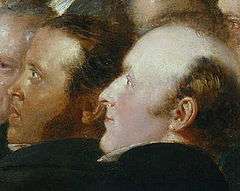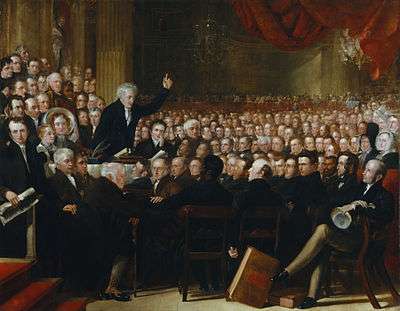John Scoble
John Scoble (January 16, 1799 – December 1877) was a British abolitionist and political figure in Canada West.
John Scoble | |
|---|---|
 To the left is William Knibb and to the right John Scoble - 1840[1] | |
| Born | January 16, 1799 |
| Died | December 1877 Ontario, Canada |
Biography
Scoble was born in Kingsbridge, England in 1799 and was educated in Devon and London. He was part of the anti-slavery movement in England and was involved in the protests against the apprenticeship system which replaced slavery in the West Indies. He helped form the British and Foreign Anti-Slavery Society and served as secretary from 1842 to 1852. He also helped revitalize the anti-slavery movement in France, corresponding with people such as François-André Isambert who took an active role in trying to free the French slaves.[2] He was not on good terms, however, with the American anti-slavery advocate William Lloyd Garrison and his followers.
He came to Upper Canada in 1852 to try to assist the British-American Institute of Science and Industry, a vocational school for black people, which was being managed by Josiah Henson, a former fugitive slave. Disputes with trustees of the institute and with Henson interfered with his attempts to reorganize the institute's finances.

- ^ The Anti-Slavery Society Convention, 1840, Benjamin Robert Haydon, 1841, National Portrait Gallery, London, NPG599, given by British and Foreign Anti-Slavery Society in 1880.
In 1860, he helped prevent the deportation of John Anderson, a fugitive slave accused of murder in Missouri. In 1861, Scoble resigned from the board of trustees of the institute. In the end, the property was sold, with the proceeds going towards an integrated school in Chatham. Scoble was elected to the Legislative Assembly of the Province of Canada in West Elgin in 1863 after the election of George Macbeth was declared invalid; he was reelected in the general election that followed later that year. He supported a decentralized federation in Canada and representation by population. Although reform-oriented, he supported Sir John A. Macdonald's leadership.
Scoble retired from politics in 1867 after failing to attain reelection, and all but disappeared from public life. He died in Ontario at the age of 79 in December 1877.[3]
Works
His published works are:[4]
- British Guiana, London, 1838
- Texas: its claims to be recognized as an independent power, by Great Britain, London, 1839
- Hill coolies; a brief exposition of the deplorable condition of the hill coolies in British Guiana and Mauritius, London, 1840[5]
- Liberté immédiate et absolue, ou esclavage, Paris, 1844 (with G. W. Alexander)
- Introduction to Lewis Tappan's Reply to charges brought against the American and Foreign Anti-Slavery Society (London, 1852)
References
- Jennings, Lawrence C. (2000-06-05). French Anti-Slavery: The Movement for the Abolition of Slavery in France, 1802-1848. Cambridge University Press. p. 184. ISBN 9780521772495. Retrieved 6 April 2018.
- Phillip W. Magness, "The Mystery of John Scoble's Disappearance," Retrieved 2013-08-30
- Biography at the Dictionary of Canadian Biography Online, accessed September 2009
- Hill coolies: a brief exposure of the deplorable condition of the hill coolies, www.indiana.edu
External links
- "John Scoble". Dictionary of Canadian Biography (online ed.). University of Toronto Press. 1979–2016.